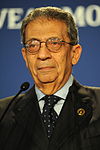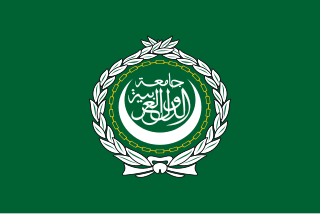
The Arab League, formally the League of Arab States, is a regional organization in the Arab world, which is located in Africa and Western Asia. The Arab League was formed in Cairo on 22 March 1945 initially with six members: Egypt, Iraq, Transjordan, Lebanon, Saudi Arabia, and Syria. Yemen joined as a member on 5 May 1945. Currently, the League has 22 members, but Syria's participation has been suspended since November 2011.
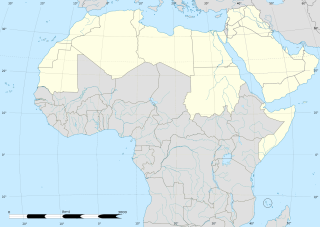
The Arab world, also known as the Arab nation, the Arabsphere, or the Arab states, consists of the 22 Arabic-speaking countries which are members of the Arab League. A majority of these countries are located in Western Asia, North Africa, and the Horn of Africa; the southernmost member, the Comoros, is an island country off the coast of East Africa. The region stretches from the Atlantic Ocean in the west to the Arabian Sea in the east, and from the Mediterranean Sea in the north to the Indian Ocean in the southeast. Arabic is used as the lingua franca throughout the Arab world.
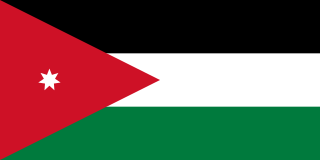
The Jordanian annexation of the West Bank occurred following the events of the 1948 Arab–Israeli War, during which Transjordan occupied territory that had previously been part of Mandatory Palestine. During the war, Jordan's Arab Legion took control of territory on the western side of the Jordan River, including the cities of Jericho, Bethlehem, Hebron, Nablus and eastern Jerusalem, including the Old City. Following the end of hostilities, the area that remained under Jordanian control became known as the West Bank.
The Arab League was formed in Cairo on 22 March 1945 with six members: Egypt, Iraq, Transjordan, Lebanon, Saudi Arabia, and Syria. Yemen joined on 5 May 1945.

The Council of Arab Economic Unity (CAEU) was founded by Egypt, Iraq, Jordan, Kuwait, Libya, Mauritania, Palestine, Saudi Arabia, Sudan, Tunisia, Syria, United Arab Emirates and Yemen on May 30, 1964, following an agreement in 1957 by the Economic Council of the Arab League.
The European Union-Mediterranean Free Trade Area, also called the Euro-Mediterranean Free Trade Area or Euromed FTA, is based on the Barcelona Process and European Neighbourhood Policy (ENP). The Barcelona Process, developed after the Barcelona Conference in successive annual meetings, is a set of goals designed to lead to a free trade area in the Mediterranean Region and the Middle East by 2010.

The Arab Club Champions Cup is an annual regional club football competition organised by the Union of Arab Football Associations (UAFA) and contested by elite clubs from the Arab world. The tournament is contested by a total of 38 teams – 19 from the Asian Football Confederation and 19 from the Confederation of African Football.
The Arab Games, also called the Pan Arab Games, are a regional multi-sport event held between nations from the Arab world. They are organized by the Union of Arab National Olympic Committees. The first Games took place in 1953 in Alexandria, Egypt. Intended to be held every four years since, political turmoil as well as financial difficulties have made the event an unstable one. Women were first allowed to compete in 1985.

The Kuwait Premier League, known as STC Premier League due to sponsorship reasons, is the top division of the Kuwait football pyramid system. Formed in 1961, Qadsia holds the best record in the competition, having won 17 times.

The United Arab Emirates Football Association is the governing body of football in the United Arab Emirates. The senior football national team made one World Cup appearance, in 1990 in Italy, won the Gulf Cup in 2007 and the Gulf Cup in 2013, the youth national team claimed the AFC U-19 Cup in 2008.
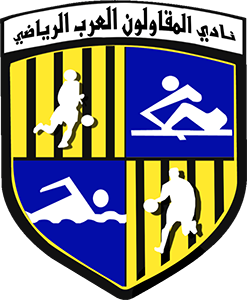
Nadi al-Mokawloon al-Arab al-Riyadi, known shortly as Al-Mokawloon al-Arab between the locals, is an Egyptian sports club based in Nasr City, Cairo. The club was founded in 1973 by the Egyptian engineer, contractor, entrepreneur, and politician Osman Ahmed Osman as the official sporting club for his prominent, regional construction company, the Arab Contractors, arguably the biggest one in the entire Middle East at that time. The club is best known for their football team, which currently plays in the Egyptian Premier League, the highest league in the Egyptian football league system.

The Headwater Diversion Plan was an Arab League plan to divert two of the three sources of the Jordan River, and prevent them from flowing into the Sea of Galilee, in order to thwart Israel's plans to use the water of the Hasbani and Banias in its National Water Carrier project for out of Basin irrigation. The plan was approved by the Arab League in 1964 but Israel prevented the project's development by conducting airstrikes in Syrian territory in April 1967.
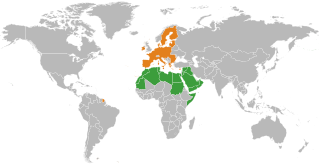
The Arab League and European Union have shared relations since the EU's development into a more political power rather than an economical one. At the 19th summit of the Arab League in Saudi Arabia, Javier Solana attended the summit. He gave the EU's full support to the Arab League's Peace Initiative of 2002. At the summit, he addressed the Arab Leaders:

The Arab League has 22 member states. It was founded in Cairo in March 1945 with six members: the Kingdom of Egypt, Kingdom of Iraq, Lebanon, Saudi Arabia, Syrian Republic, and Transjordan. North Yemen joined on 5 May 1945. Membership increased during the second half of the 20th century. Five countries have observer status.

The UAE Pro League, known for sponsorship reasons as the Arabian Gulf League, is the top professional football league in the United Arab Emirates (UAE). The first team to win the title was Al Orouba (Sharjah), whilst Al Ain has the record with 13 league titles to their name. Fourteen clubs compete in the League that operates on a system of promotion and relegation with the First Division League.

On December 19, 2011, the Syrian government agreed to allow foreign observers from the Arab League to monitor Syria's progress in removing troops from protest areas, free political prisoners, and negotiate with dissidents. The mission was in accordance with the Arab League peace plan aimed to resolve the Syrian crisis. The monitors were dispatched and supported by the Arab League.

Mandatory Palestine was a geopolitical entity established between 1920 and 1948 in the region of Palestine under the terms of the Mandate for Palestine.

The Arab Higher Committee or the Higher National Committee was the central political organ of the Arab Palestinians in Mandatory Palestine. It was established on 25 April 1936, on the initiative of Haj Amin al-Husayni, the Grand Mufti of Jerusalem, and comprised the leaders of Palestinian Arab clans and political parties under the mufti's chairmanship. The Committee was outlawed by the British Mandatory administration in September 1937 after the assassination of a British official.

The Arab League boycott of Israel is a strategy adopted by the Arab League and its member states to boycott economic and other relations between Arabs and the Arab states and Israel and specifically stopping all trade with Israel which adds to that country's economic and military strength. A secondary boycott was later imposed, to boycott non-Israeli companies that do business with Israel, and later a tertiary boycott involved the blacklisting of firms that that do business with other companies that do business with Israel.
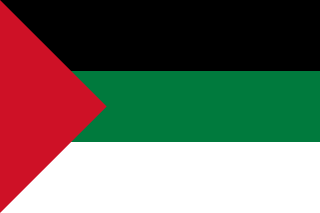
The All-Palestine Protectorate, or simply All-Palestine, also known as Gaza Protectorate and Gaza Strip, was a short-living client state with limited recognition, corresponding to the area of the modern Gaza Strip, which was established in the area captured by the Kingdom of Egypt during the 1948 Arab-Israeli War and allowed to run as a protectorate under the All-Palestine Government. The Protectorate was declared on 22 September 1948 in Gaza City, and the All-Palestine Government was formed. The Prime Minister of the Gaza-seated administration was Ahmed Hilmi Pasha and the President was Hajj Amin al-Husseini, former chairman of the Arab Higher Committee. In December 1948, just three months after the declaration, the All-Palestine Government was relocated to Cairo and was never allowed to return to Gaza, making it a government in exile. With further resolution of the Arab League to put the Gaza Strip under the official protectorate of Egypt in 1952, the All-Palestine Government was gradually stripped of authority. In 1953, the government was nominally dissolved, though the Palestinian Prime Minister Hilmi continued to attend Arab League meetings on its behalf. In 1959, the protectorate was de jure merged into the United Arab Republic, while de facto turning Gaza into military occupation area of Egypt.



